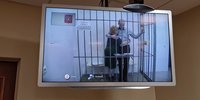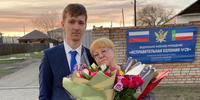Case of Baranovskiy in Abakan
Filter
- #
The Federal Security Service of Russia for the Republic of Khakassia sends a report to the Investigative Committee of the Russian Federation for the Republic of Khakassia to the Investigative Committee for the Republic of Khakassia "on the detection of signs of a crime" in relation to Valentina Baranovskaya and Roman Baranovskiy.
- #
Senior investigator of the Investigative Department for the city of Abakan of the Investigative Department of the Investigative Committee of the Russian Federation for the Republic of Khakassia A.V. Pachuev initiates a criminal case against 44-year-old Baranovsky Roman and his mother Valentina under Article 282.2 Part 1 of the Criminal Code of the Russian Federation ("organization of activities of a banned organization"). Later, Valentina was commuted to Part 2 of Article 282.2 of the Criminal Code of the Russian Federation ("participation in the activities of a liquidated organization").
Armed law enforcement officers are conducting searches at four addresses. Bibles, personal records, electronic devices and various media are seized from believers.
- #
- #
To be published later.
- #
Valentina Baranovskaya was charged under Article 282.2 (2) of the Criminal Code of the Russian Federation. Valentina pleaded not guilty and considers the charge unlawful because she did not commit any crimes, but only exercised her right to freedom of religion enshrined in the Constitution.
- #
The indictment revealed violations of the requirements of criminal procedure legislation, which prevent the case from being transferred to the court for consideration on the merits.
First Deputy Prosecutor of the Republic of Khakassia, Senior Counselor of Justice Andrei Mondokhonov decides to return the criminal case to the investigator for the Department of Internal Affairs of the Investigative Committee for the city of Abakan of the Main Investigative Directorate of the Investigative Committee of Russia for the Krasnoyarsk Territory and the Republic of Khakassia Ermakova O. M. for "rewriting the indictment and eliminating the identified violations."
- #
The believers were notified of the end of the investigation and given an indictment. The measure of procedural coercion remained the same - the obligation to appear. There are still no victims in the case.
- #
The first hearing on the merits of the case begins. It becomes known that in the morning Valentina Baranovskaya felt bad. The believer is called by a medical team. The ambulance doctor sends her to the hospital for examination and prescribes treatment in the hospital.
- #
During the trial, the prosecutor voices the charges. Roman spoke with an attitude to the accusation. Valentina, due to poor health, could not speak and simply attached her attitude to the accusation. The next meeting is scheduled for July 23, 2020.
- #
Valentina Baranovskaya is taken to the hospital with a diagnosis of stroke.
- #
The defendant is in the hospital in a state of moderate severity, according to doctors. The court postpones the hearing to July 27 to find out whether she will be able to participate in the trial for health reasons.
- #
Hearings on the merits are resumed in the Abakan City Court. Nikolai Stepanovich Volkov, a candidate of philosophical sciences, a religious scholar, is being interrogated as a specialist. In response to the prosecutor's request to describe the activities of Jehovah's Witnesses, Volkov notes: "They preach, of course, the Gospel. [...] In fact, their sermons are nothing illegal. [...] Morally, they are ordinary, deeply decent people."
At the same time, Volkov is biased about the printed publications of Jehovah's Witnesses, ironically at the fact that the illustrations depict representatives of different, including non-Slavic, peoples.
- #
Valentina Baranovskaya testifies in the Abakan City Court.
She emphasizes that, despite the ban of a legal entity — the local religious organization of Jehovah's Witnesses in Abakan (decision of the Supreme Court of the Russian Federation of 20.04.2017) — everyone has the full right to practice their religion in accordance with Article 28 of the Constitution of the Russian Federation. The defendant adds: "From the point of view of the Supreme Court and the authorities of our country, believing in God, reading the Bible, singing songs of praise to God is not extremism, this is normal, this is the ordinary life of a believer." Further, Valentina explains the difference between a legal entity and ordinary believers with an example: if a chess club ceases to exist, then an amateur chess player does not stop playing chess. It clarifies that the term "Jehovah's organization" is not a legal, but a spiritual confessional one, and does not refer to a legal entity, but to all believers in the world who live according to the order established by God.
To the accusations of believers of "harming people and the state," Valentina replies that thanks to the Bible she became peaceful, fair, loving people and God, and learned to respect the authorities and their laws. "And if I hadn't done that, I couldn't have been called one of Jehovah's Witnesses," she says, wondering: "What is my crime? That I believe in a God whose name is Jehovah?"
The court attaches Baranovskaya's medical documents to the case. The believer claims that the unfair accusation led to serious health problems: in the summer of 2020, she was diagnosed with an ischemic stroke. She needs constant supervision and help. "If my son is imprisoned, how will I be left alone? I have only one son, and it is he who is my support, support and helper."
Judge Elena Shcherbakova schedules the arguments of the parties for February 1, 2021.
- #
The debate begins in the Abakan City Court. Prosecutor Svetlana Shestakova requests for Roman Baranovsky 8 years of imprisonment in a penal colony, 1 year of restriction of liberty and 3 years of ban on holding senior positions in public organizations. The prosecutor demands that Valentina Baranovskaya be sentenced to 5 years in prison in compliance with similar restrictions.
The believers are scheduled to speak at the debate on February 8, 2021.
- #
Valentina Baranovskaya speaks in the debate in the Abakan City Court.
She notes that the 5 years in prison requested by the prosecutor for her and 8 years for Roman is a record cruel punishment. At the same time, neither the case materials nor witness testimony confirm that the defendants committed actions or appeals of an extremist nature.
Valentina says: "It does not follow from the content of my conversations presented in the materials of the criminal case that I had an intent to commit extremist actions ... My only intention is to remain a Christian."
She also notes that the investigation did not find a single copy of banned literature in her house, and the fact of mass distribution of any materials from the FSEM list was not established.
In her speech, Valentina emphasizes that her religious views are based on the Bible and are expressed in love for people, which is the exact opposite of what is called extremism. According to the believer, in fact, she is accused of believing in God and talking about it with her family and friends.
- #
Roman Baranovsky speaks in the debate. He draws the court's attention to the fact that in this trial the prosecution was unable to provide any evidence of his guilt either in promoting the superiority of the religion of Jehovah's Witnesses over other religions, or in organizing money collections, or in mass distribution of prohibited literature, or in any other crime. "The prosecution did not cite a single specific extremist statement or act on my part, and this is not surprising, since there are no such statements in the case materials," the believer notes, "I see that the prosecution used a certain template against me, which is often heard in the media, to indiscriminately defame those they do not like." From the materials considered by the court, it is obvious that the defendant discussed biblical principles directly opposite to what he is charged with, such as "do not give up, doing good", "forgive your enemies", "let us do good to all".
Roman Baranovsky draws the court's attention to the bias and incompetence of the experts who gave opinions in the criminal case, as well as prosecution witnesses, one of whom stated in her testimony that she "does not like ... [Baranovskiy] because they are Jehovah's Witnesses."
At the end of his speech, the believer says that in the end, "his confession of the unforbidden faith of Jehovah's Witnesses by unforbidden means in accordance with Article 28 of the Constitution of the Russian Federation" was proved.
- #
Judge Shcherbakova announces the verdict: Valentina Baranovskaya is found guilty under Article 282.2 (2) of the Criminal Code of the Russian Federation and sentenced to 2 years in prison in a penal colony. Roman Baranovsky was found guilty under Article 282.2 (1) of the Criminal Code of the Russian Federation and sentenced to 6 years' imprisonment in a general regime colony.
In the history of the latest repressions of Jehovah's Witnesses, the sentence has no precedent in 2 respects: for the first time the sentence of imprisonment was imposed on a woman and for the first time the sentence of imprisonment was imposed under the milder part 2 of Article 282.2 of the Criminal Code of the Russian Federation (participation in a banned organization).
The verdict has not entered into force. It will be appealed.
Valentina and Roman Baranovsky were taken to pre-trial detention center No. 1 in the Republic of Khakassia (Molodezhny Square, 22B, Abakan, Republic of Khakassia, 655017).
The last word of the defendant Roman Baranovsky in Abakan The last word of the defendant Valentina Baranovskaya in Abakan - #
The Supreme Court of the Republic of Khakassia rejects Valentina and Roman Baranovsky in satisfying their appeals against the unprecedentedly cruel sentence of a lower court. 70-year-old Valentina Baranovskaya will go to the colony for 2 years, her son - for 6 years.
- #
Valentina Baranovskaya is transferred to correctional colony No. 28 (Ust-Abakan, Podgorny Kvartal, 13).
Her son, Roman Baranovsky, is still in the Abakan pre-trial detention center.
- #
It becomes known that Roman Baranovsky left the pre-trial detention center in Abakan. He is in the process of moving to one of the institutions of the Federal Penitentiary Service of the Trans-Baikal Territory.
- #
- #
It becomes known that Roman Baranovsky was taken to correctional colony No. 3 in Chita, where he will serve his sentence.
- #
The lawyer visits Valentina in the colony. He notes her positive attitude. Despite her serious health problems, she helps other prisoners with cleaning, and this has a positive effect on her relationships with others.
In the colony, Valentina was visited by a doctor who confirmed her earlier diagnosis. The administration and medical staff of the colony listened to the expert's opinion, thanks to which Valentina was able to receive the necessary daily treatment. This had a beneficial effect on the health of the elderly believer.
Valentina intends to apply for parole and is already trying to do everything possible to avoid complaints from the administration. But in case of refusal, the believer is ready to serve her term in full.
- #
The Ust-Abakan District Court denies Valentina Baranovskaya early release from the colony.
- #
Judge of the Ust-Abakan District Court Maria Zablotskaya satisfies Valentina Baranovskaya's petition for parole. This decision was opposed by the prosecutor and the administration of Correctional Colony No. 28, arguing that Valentina "did not repent" because she did not stop professing the religion of Jehovah's Witnesses. Within 10 days, the prosecutor's office may appeal the court decision. The elderly woman has been behind bars for a year.
- #
Assistant to the Abakan prosecutor V. Hasan appealed against the parole of 70-year-old believer Valentina Baranovskaya. She remains in the penal colony at least until the appeal decision. Hasan continues to insist that since the believer did not renounce her faith in Jehovah, then she did not repent of the crime committed. Valentina Baranovskaya insists that she did not take part in extremist activities and did not resume the activities of a banned organization, but simply exercises her right to freedom of religion.
- #
The lawyer visits Valentina Baranovskaya in the penal colony. The woman continues to struggle with the progressive disease, in addition, she feels the pressure from the institution. For example, the administration of the colony took away from her the Bible in the Synodal translation of the Orthodox publishing house, referring to a certain explanation of the priest serving at the colony. A lawyer's request was sent to the administration of the colony on this fact.
- #
The Supreme Court of the Republic of Khakassia does not satisfy the prosecutor's appeal against the court's decision of February 22, 2022. The believer receives parole. Valentina Baranovskaya is released.
- #
The lawyer visits Roman Baranovsky in the colony. The believer remains positive, but he is very worried about his mother and really wants to see her. She tries to help him as much as she can.
5 days a week, Roman works in a sewing workshop where medical overalls are sewn. Roman gets great joy from reading the Bible and letters of support and looks forward to new ones.
- #
Roman Baranovsky is kept in a barracks, in which, in addition to him, there are about 80 other prisoners. His relationship with the administration and other prisoners is neutral. In the colony, the believer even received dental care.
Roman tries not to lose heart, but he worries about his 73-year-old mother, who has to travel 2500 km to see her son.
The believer took part in a professional skill competition and won first place in the profession of a tailor.
- #






